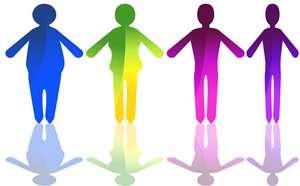
EDNOS
Eating Disorders not otherwise specified (EDNOS)
EDNOS is a diagnostic term for a pattern of disordered eating that does not fit the criteria for defined eating disorders (currently anorexia and bulimia). It is likely that a sufferer diagnosed with EDNOS will display behaviours from both disorders, or not completely match the diagnostic criteria (ie a sufferer may not engage in behaviours often enough as in bulimia, or may not currently meet current weight criteria for anorexia). It is also used as a catch all for Binge Eating Disorders and other chaotic eating habits not otherwise defined.
 It is important to note that this is a diagnostic 'catch all' and not an eating disorder in its own right, it does not carry across the distress a sufferer may be feeling. The term simply means a sufferer simply do not fit the strict criteria for other disorders, this is despite professionals labelling the diagnosis of eating disorders as outdated.
It is important to note that this is a diagnostic 'catch all' and not an eating disorder in its own right, it does not carry across the distress a sufferer may be feeling. The term simply means a sufferer simply do not fit the strict criteria for other disorders, this is despite professionals labelling the diagnosis of eating disorders as outdated.
Sufferers of disorders labelled as EDNOS are likely to be under the same emotional turmoil that drives other eating disordered behaviours and it does not negate the seriousness of their potential illness. The conditions this diagnosis encompasses are still serious psychological disorders.
Orthorexia
While not accepted currently as a condition by the psychiatric community, this disorder technically fits under EDNOS, as it is a destructive eating behaviour. It is a fairly new term and is characterised by a strict and obsessive occupation with healthy foods or by excluding and labelling foods as 'safe' or 'off limits'.
Controversy
There currently debate over diagnosis criteria due to the nature of current guidelines, for example; if someone is not missing a period or does not have a very low body weight they are not diagnosable with anorexia but instead an EDNOS. This is under review for the new edition of the DSM, due out in 2013.
Many feel that the diagnostic criteria for all eating disorders need less of a focus on the physical effects of the illness, as they are psychological conditions. People of a normal weight for instance can still suffer from the devastating psychological effects of anorexia, but due to the weight criteria will often not be taken as seriously as someone of a lower weight.
Treatment
Treatment will be for the symptoms displayed and due to the open nature of the EDNOS diagnosis will be entirely dependent on the symptoms displayed. Like all eating disorders, that treatment is largely psychological. It is important that you seek help and we recommend you speak to your GP. As with any condition if you are not entirely satisfied with diagnosis or treatment options you are entitled to a second opinion.
Find an eating disorder therapist
Related Guides





















